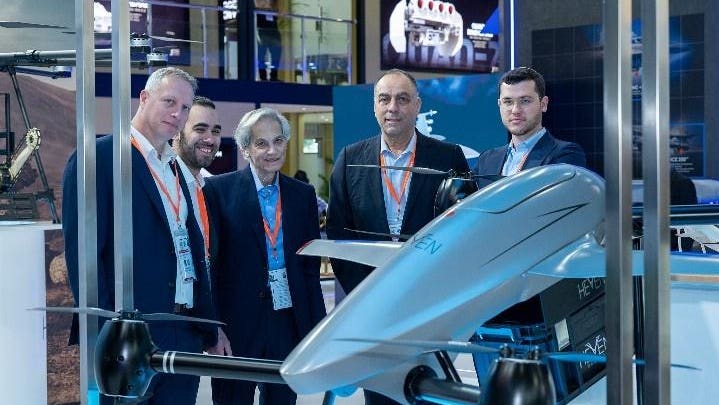The H2D55 model on display
HEVEN DRONESTwo decades ago, hydrogen technology was predominantly associated with emissions-free light-duty vehicles. However, in recent years, hydrogen has expanded its initial boundaries, encompassing more and more industries. One of the recent vectors has been the aviation sector, which seemed an impossible candidate for hydrogen adoption. Technically, fuel cells have been in use for quite some time; early hydrogen-based fuel cells were developed for the space program, and their alkaline versions reliably powered the space shuttles. Even in the realm of non-fuel cell hydrogen planes, historical examples can be found. Recently, both commercial aviation giants Boeing and Airbus have embraced the integration of hydrogen into their products. Additionally, companies like Zero-Avia and United Hydrogen are actively developing the smaller frame market, while several players are entering the fuel cell drone market. In this context, let’s delve into the innovative journey of Heven Drones, an Israeli company trailblazing fuel cell-based drone technology.
Heven Drones‘ journey began in Israel in 2019, a hub for technological innovation, where they leveraged government funding to incubate their groundbreaking technologies. Despite Israel’s limited size, it provides fertile ground for tech startups. Heven Drones capitalized on the local environment for research and development, creating endurance drones with fuel cell technology that surpasses the range limitations of battery-powered alternatives. The company has grown to approximately 40 people, including small-scale manufacturing tailored to domestic and select global markets. Recognizing the immense potential of the U.S. market, Heven Drones expanded to Miami, strategically positioned between North and South America. The city’s favorable weather conditions facilitate drone testing and operations. Furthermore, due to its aerospace history, Miami offers access to top talent and advanced manufacturing facilities. The company is pursuing small series production with an undisclosed local partner, targeting several hundred drones per month, emphasizing the importance of quality and attention to detail over mass manufacturing.
Assembly floor for heavy duty drones in Israel
HEVEN DRONES Heven Drones‘ fuel cell technology spans from the 3 kW H2D55 model for basic drones to the 15-16 kW H2D200 model for larger applications. For the latter, their goal is to create a swarm of drones, each with a 35 kg payload capacity and flight times far surpassing the limitations of traditional batteries. Collaborations with companies like Plug Power and Intelligent Energy have empowered Heven Drones to develop lightweight, high-power fuel cells optimized for drone use. These partnerships ensure scalability and efficiency. Plug Power, drawing from its expertise in the forklift market, will be working on the 15 kW range, aligning with the drone’s needs, while the Intelligent Energy product supports the 3-4 kW range. Energy density is a critical factor for drones, and Heven Drones has showcased substantial improvements by transforming an experimental drone from a 25-minute battery flight to an impressive four-fold 100-minute flight on a fuel cell. Optimization of design, customized hydrogen tanks, and, notably, future liquid hydrogen propulsion promise even longer flight times. The H2D55 model with a 7 kg payload has undergone testing and is being prepared for its first customer.
Like many fuel cell technology providers, Heven Drones is actively working on a commercial fueling solution to streamline refueling processes. Their approach envisions hub-based and hub-to-hub operations, simplifying refueling logistics for customers. Efforts to design a micro electrolyzer and an integrated fueling interconnection are underway, with a focus on engineering solutions.
Alex Ivanenko, the CEO of HyWatts Inc., shared that during his tenure as the CEO of HyPoint, a high-temperature aviation fuel cell manufacturer before its acquisition by Zero-Avia, the company explored drone applications. Due to the underdeveloped market and strong competition from battery-powered drones, the decision was made to pursue the more lucrative large frame market.
Despite the challenges, Heven Drones is betting that the fuel cell drone market holds immense potential, with applications in policing, military, firefighting, industrial settings, smart cities, and more. They anticipate a future where fuel cell drones become a commodity, offering competitive pricing and extended lifecycles compared to batteries. Bentzion Levinson, Founder & CEO of Heven Drones, noted, „I sincerely believe that the drone market is a very large blue ocean that today is not yet accessible, and hydrogen fuel cells are the key to unlocking this potential together with industry advancements around hydrogen infrastructure and drone regulations.“

